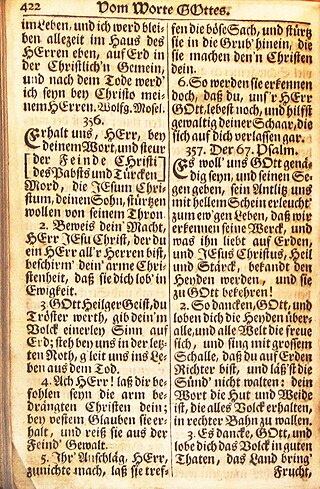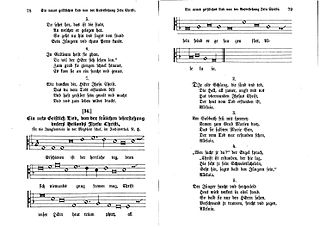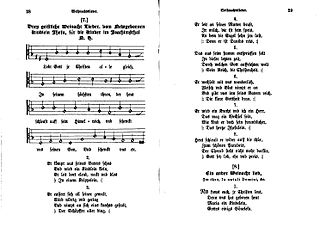Related Research Articles
"Wär Gott nicht mit uns diese Zeit" is a Lutheran hymn, with words written by Martin Luther based on the Psalm 124. The hymn in three stanzas of seven lines each was first published in 1524. It was translated to English and has appeared in 20 hymnals. The hymn formed the base of several compositions, including chorale cantatas by Buxtehude and Bach.
Michael Weiße or Weisse was a German theologian, Protestant reformer and hymn writer. First a Franciscan, he joined the Bohemian Brethren. He published the most extensive early Protestant hymnal in 1531, supplying most hymn texts and some tunes himself. One of his hymns was used in Johann Sebastian Bach's St John Passion.

Nikolaus Herman was a German Lutheran cantor and teacher, creating numerous Protestant hymns. Some of them are contained in hymnals in several languages.
"Nun lob, mein Seel, den Herren" is a Lutheran hymn written in German by the theologian and reformer Johann Gramann in 1525. It was published in 1540 and appears in 47 hymnals. A translation by Catherine Winkworth, "My Soul, now Praise thy Maker!", was published in 1863.

"Gelobt sei Gott im höchsten Thron" is a hymn for Easter in 20 stanzas in German by Michael Weiße, widely known with a later melody by Melchior Vulpius. Shortened, it is part of current Protestant and Catholic German hymnals.

"Erhalt uns, Herr, bei deinem Wort" is a Lutheran hymn by Martin Luther with additional stanzas by Justus Jonas, first published in 1542. It was used in several musical settings, including the chorale cantata by Johann Sebastian Bach, Erhalt uns, Herr, bei deinem Wort, BWV 126.

"Allein Gott in der Höh sei Ehr" is an early Lutheran hymn, with text and melody attributed to Nikolaus Decius. With the reformers intending church service in German, it was intended as a German version of the Gloria part of the Latin mass, used in almost every service. Decius wrote three stanzas, probably in 1523, while a fourth was added, probably by Joachim Slüter.
"Der Geist des Herrn erfüllt das All" is a Christian hymn for Pentecost by Maria Luise Thurmair, written in 1941. First printed in 1946, it appeared with a 1609 melody by Melchior Vulpius in the German Catholic hymnal Gotteslob in 1975 as GL 249. It has been included in ecumenical hymnals and songbooks.

"Was mein Gott will, das g'scheh allzeit" is a Lutheran hymn in German. The text from c. 1550 is attributed to Albert, Duke of Prussia. The melody, Zahn No. 7568, goes back to a tune by Claudin de Sermisy, written in 1529 for a secular French song. The hymn has belonged to core Lutheran hymnody without interruption and is part of the Protestant hymnal Evangelisches Gesangbuch as EG 364.

"Erschienen ist der herrlich Tag" is a German Easter hymn, with text and tune written by Nikolaus Herman and published in 1561. It has inspired musical settings by composers from the 17th to the 20th century. It appears in several hymnals, including the German Protestant hymnal Evangelisches Gesangbuch. Other hymns, especially Easter hymns, in both German and English, are sung to the same melody.

"Nun danket all und bringet Ehr" is a German Lutheran hymn in nine stanzas, with a text written by Paul Gerhardt. It was first published in 1647, in Johann Crüger's Praxis pietatis melica which was the first publication of hymns by Gerhardt. In the 1653 edition, Crüger added a melody that he composed. As a general song of thanks, the song has appeared in several hymnals, including the German Protestant hymnal Evangelisches Gesangbuch and the Catholic hymnal Gotteslob. It has inspired musical settings by composers from the 17th to the 21st century. Johann Sebastian Bach used the first stanza in a cantata, however with the melody of "Lobt Gott, ihr Christen alle gleich", Hugo Distler composed a chorale cantata, and Günter Berger based a toccata for organ on it.

"Christus, der uns selig macht" is a German Lutheran Passion hymn in eight stanzas in German by Michael Weiße, written in 1531 as a translation of the Latin hymn "Patris Sapientia" to an older melody of the Bohemian Brethren.

"Macht hoch die Tür" is a popular German Advent hymn, written in 17th century Ducal Prussia. The lyrics were written by Georg Weissel in 1623 for the inauguration of the Altroßgärter Kirche in Königsberg. The melody that is now associated with the text appeared first in 1704 in the hymnal by Johann Anastasius Freylinghausen.

"Lobt Gott, ihr Christen alle gleich" is a German Christmas carol with lyrics and melody by Nikolaus Herman. It is part of Protestant and Catholic hymnals, has inspired musical settings, and has been translated. The title is also known as "Lobt Gott, ihr Christen allzugleich".

"Gott ist gegenwärtig" is a Christian hymn in German by the Reformed writer Gerhard Tersteegen, published in 1729, based on a 1680 melody by Joachim Neander. The hymn, with the melody simplified, is part of the Protestant hymnal Evangelisches Gesangbuch as EG 165 and the 2013 Catholic hymnal Gotteslob as GL 387. Seven of its eight stanzas are part of the Mennonite hymnal as No. 1. The hymn is regarded as an expression of Christian mysticism. It was translated to English in various versions.

"Dein Lob, Herr, ruft der Himmel aus" is a German Catholic hymn. Adolf Lohmann adapted a 1659 hymn by the Jesuit astronomer Albert Curtz, who paraphrased Psalm 19. The melody appeared in Augsburg in 1669. It was No. 1 in the 1938 hymnal Kirchenlied and is part of the German Catholic hymnal Gotteslob as GL 381.
"Vertraut den neuen Wegen" is a Christian hymn in German. It was written by Klaus-Peter Hertzsch as occasional poetry for a wedding in East Germany in 1989, shortly before the fall of the Berlin wall. The text is focused on new ways and trust in God. It is sung to the 1529 melody of "Lob Gott getrost mit Singen". The hymn is part of the current Protestant hymnal, and of other hymnals.
"O komm, du Geist der Wahrheit" is a Lutheran hymn for Pentecost in German. The text was written by Philipp Spitta, probably in 1827, and published in 1833 in the song collection Psalter und Harfe. It is a prayer to the Holy Spirit for courage to confession in a time poor in faith. The hymn which first appeared without a melody, is now usually sung to the 1529 melody of "Lob Gott getrost mit Singen". It is part of the current Protestant hymnal, and of other hymnals.
"Wir weihn der Erde Gaben" is a Christian offertory hymn with text by Petronia Steiner to the melody of the 1529 "Lob Gott getrost mit Singen". It appeared in the first edition of the Catholic hymnal Gotteslob and is part of its second edition. Several composers wrote settings for use in church.
"Ich lobe meinen Gott von ganzem Herzen" is a Christian hymn in German, with a first stanza by Gitta Leuschner, written in 1980, and two more stanzas that Günter Balders added in 2002. The text is based on Psalm 9. The original song came from France and was a rather close paraphrase of the psalm, to a melody composed by Claude Fraysse in 1976. The song of the genre Neues Geistliches Lied (NGL) has appeared in the German Protestant and Catholic hymnals and songbooks, especially collections for children.
References
- 1 2 3 "Lob Gott getrost mit Singen". liederdatenbank.de (in German). Retrieved 21 February 2021.
- 1 2 "Lob Gott getrost mit Singen". hymnary.org. Retrieved 28 February 2021.
- 1 2 3 4 "Lob Gott getrost mit Singen / O komm, du Geist der Wahrheit" (in German). Carus-Verlag . Retrieved 21 February 2021.
- ↑ "4Bibeln: Gesangbuch / Evangelisches Gesangbuch 243". Evangelisches Gesangbuch / Niedersachsen – Bremen (in German). Retrieved 9 October 2022.
- ↑ "Praise God, praise God with singing". hymnary.org. Retrieved 13 February 2021.
- ↑ "Lob Gott getrost mit Singen". hymnary.org. Retrieved 21 February 2021.
- 1 2 "Let me be Thine forever". hymnary.org. Retrieved 13 February 2021.
- ↑ "Wir weihn der Erde Gaben (L) / Gesänge - Woche - Gesänge zur Gabenbereitung" (in German). gottesdienstinstitut.org. Retrieved 13 March 2021.
- ↑ Steinmann, Wolf-Dieter (15 February 2015). "Vertraut den neuen Wegen" (in German). SWR . Retrieved 13 March 2021.
- ↑ "Lob Gott getrost mit Singen" (PDF). kirchenmusikerverband-ekbo.de (in German). Retrieved 21 February 2021.
- ↑ "Lob Gott getrost mit Singen". Strube Verlag (in German). Retrieved 28 February 2021.
- ↑ "Lob Gott getrost mit Singen (EG 243)". johannes-petzold.de (in German). Retrieved 28 February 2021.
- ↑ Free scores by Lob Gott getrost mit Singen at the International Music Score Library Project (IMSLP)
- ↑ ""Lobt Gott getrost mit Singen." / Liederheft mit 51 Gesangbuchliedern für den Gottesdienst im Altenheim" (in German). gottesdienstinstitut.org. Retrieved 3 March 2021.
- ↑ "Lobt Gott getrost mit Singen" (in German). Diakonie Bavaria. Retrieved 28 February 2021.